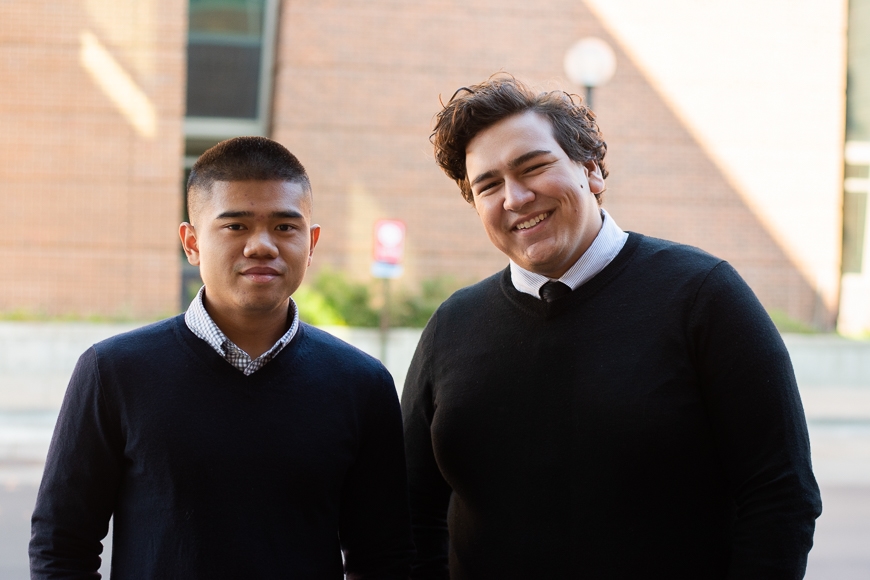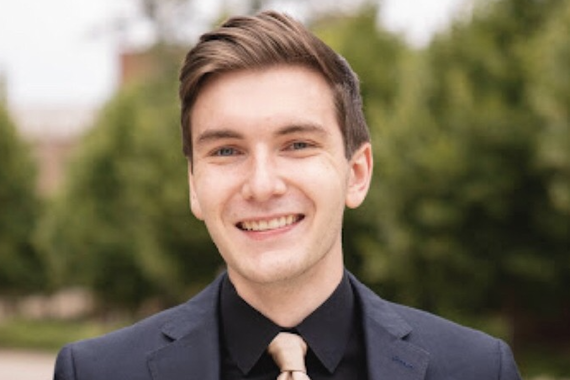Of Dreams, Teams, and Aspiring for PhDs
“Great guy!” exclaims Alex Djanin.
“Fantastic guy,” chimes in Nikhil Saxena.
These two undergraduate research assistants are talking about their mentor, Assistant Professor Joseph Mullins, who is guiding their work for the Heller-Hurwicz Economics Institute’s highly selective undergraduate research program.
Each semester a limited number of undergraduate students are selected to assist faculty members with ongoing research. For undergraduates seeking to earn a PhD at a later time in their careers, becoming an undergraduate research assistant for a faculty member is an opportunity to develop insights into the research process while fostering a relationship with a respected professor.
A Professor’s Perspective
This program is not just extremely rewarding for undergraduates, but also for the faculty members who mentor them. “Working with Alex and Nikhil has been great,” says Mullins. “They have both taken to this side of things really well, and seem to be enjoying getting their hands dirty with real economic research,” says Mullins.
The research assistantship allows students to work closely with and under the guidance of a professor, and both Saxena and Djanin believe that Professor Mullins’s warm and approachable personality has allowed them to get more out of this program. “Jo is always eager to explain things to us,” says Saxena. “We are curious people, and Jo is always willing to tell us why we are doing something and how to go about it,” adds Djanin.
The Students
Saxena, a senior double-majoring in economics and statistics and minoring in mathematics, grew up in Minnesota and fell in love with economics after taking a high school class. “My teacher was super inspiring and I got a good grasp of the subject,” says Saxena. Though he briefly considered majoring in computer science, he quickly realized that his heart was in economics. “After taking my first class here I just got super excited because I love doing math and modeling real-world problems, and economics gave me a chance to explore those passions,” he explains.
Besides being a research aficionado, Saxena is active in a variety of clubs and societies on campus. “I think the most important skill I have to develop is time management,” he laughs, “I am the president of an acapella group on campus, the treasurer for the College of Liberal Arts Student Board, the finance manager for The Wake Student Magazine, and have recently been appointed to help another professor at the University of Chicago with his research!”
Djanin, a junior, has a slightly different story to tell. An international student who grew up in Singapore, he came to the University on a scholarship and decided to double major in economics and mathematics, with a minor in statistics.
“The reason I love economics is that it is a good combination of math, computer science, statistics, and a little bit of, if you can believe it, psychology. These are all the things I enjoy studying.” Because of Djanin’s outstanding academic record, he was recently awarded the prestigious Carla Haugen and John Dexheimer Scholarship in economics. He says, “I am very grateful for this scholarship; it allows me to spend time doing what I love, which is research, and less time worrying about how to pay for it.”
The Research
Under Mullins’s mentoring, Saxena and Djanin are currently examining a series of welfare reform experiments, featuring programs that posed as alternatives to the Aid to Families with Dependent Children (AFDC) program. “We are trying to create a dynamic model that allows us to test out the different policy benefit equations and see which one is best for child outcomes specifically,” says Saxena. “Children are the future of human capital of the United States, so what we are ultimately interested in is their overall development,” Djanin adds.
As a part of this project, Saxena and Djanin have had the chance to collect data and create databases. Their next step is to jump into programming the model. “So far, most of the work we have done has been rewriting the benefits package equations,” Saxena describes. Programming the model involves digging through reports to find numbers and adapting rules into equations before the coding can begin. Saxena and Djanin are new to programming dynamic models, and hence are currently supporting one of Mullins’ graduate students, Fil Babalievsky, to get a better grasp of the process. They will eventually start working independently in Julia, the statistical programming language being employed in the research.
Mullins explains that research is, “very different from undergrad study, because all of a sudden there is no clear answer, you have to feel your way through things and make decisions for yourself.” Though challenging, Mullins agrees that the program is a good representation of real research. “One of the good things about this program is that it gives undergrads an insight into how research is done, the difficult decisions that have to be made, the inevitable mistakes, and the compromises you have to make to get to the finish line,” says Mullins.
The Promise of a Bright Future
Throughout the process of working with Mullins, Saxena and Djanin have not just learned of the nitty-gritty details of the research process, but have developed a lively camaraderie and mastered the art of teamwork.
Saxena believes that this experience has also given him a headstart in research. “We are getting to learn a lot of graduate- and doctorate-level economics that we wouldn’t be exposed to otherwise,” states Saxena. Djanin adds, “When we go to graduate school, our first year will be a lot easier than those who did not get the same experience. Besides, regardless of what you’re looking for—exposure, a job, or if you actually want to do this for a living—this program is great because it prepares you for all these options!”
This story was written by an undergraduate student in CLA.



